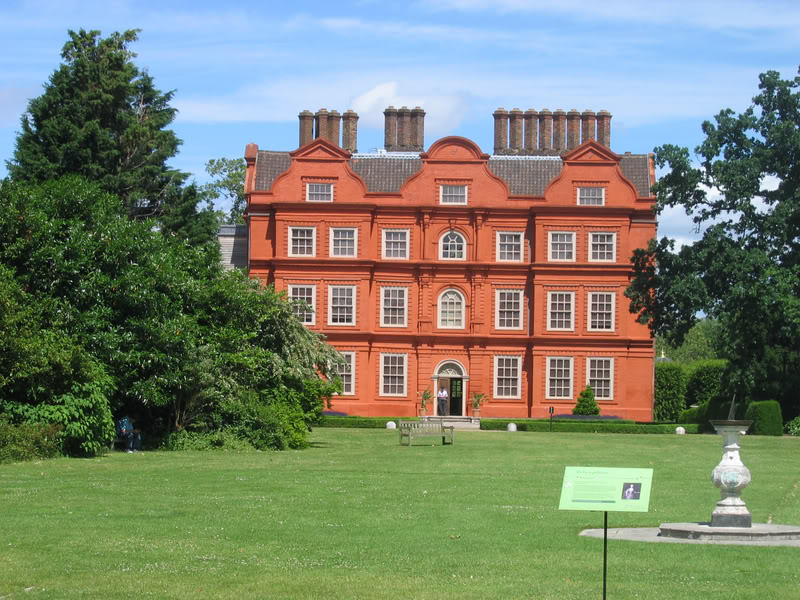|
London Sights to See
Kew Palace and Gardens
|

|
In Amadeus, the Austrian ruler announces, "It's good to be king!"
Well, for a good portion of history, it hasn't been so bad to be a
wealthy merchant either. Kew Palace, a popular London sightseeing target, also known as Dutch House until
1827, was built in 1631 for the Dutch merchant Samuel Fortrey.
Mr. Fortrey's descendants wisely leased the Jacobean mansion
to Queen Caroline
in 1728 for 99 years for "the rent of £100 and a fat doe".
By almost any standards, the Queen made an excellent bargain.
For that fair price, she received a palace and gardens that are now the rival of any in the world and a mecca for visitors to London.
Though small by contemporary standards the 21m(70ft) by 15m(50ft)
structure has been recently restored to its former splendor. The ten
year project has had stellar results, even down to some excellent and
unique Flemish
brickwork.
Renovated to the period of 1804 when it was the home of King George III , there are now on display uncovered secret rooms
and exhibits of the monarch's many interests in art, science, music and
the like. (Yes, that king. The one who gave "the colonies" all the
trouble. Apparently, he didn't find it that good to be king.) , there are now on display uncovered secret rooms
and exhibits of the monarch's many interests in art, science, music and
the like. (Yes, that king. The one who gave "the colonies" all the
trouble. Apparently, he didn't find it that good to be king.)
Included is the restored doll's house of the princesses as well as
numerous paintings that would have been seen daily by the king, his
wife Queen Charlotte
and their fifteen children. (Yes, I said "fifteen".)
The second floor is very much as it was 200 years ago.
Open to the public since the decree of Queen Victoria , except for the interval of restoration, the palace has
several other attractions. Not least of these are the world-famous Royal Botanic Gardens outside the palace. , except for the interval of restoration, the palace has
several other attractions. Not least of these are the world-famous Royal Botanic Gardens outside the palace.
From its humble beginning as a mere nine acres in 1751, the plants and grounds have, "blossomed", you might say, to its current three hundred
acres. It's estimated that the gardens probably house as much as 12% of examples of the world's known plant species.
Ever popular is the Chinese
Pagoda with its excellent view of the landscape, erected
in 1761. There are six large Victorian greenhouses,
such as the glass and iron Palm
House from 1848. Palm House was one of the first uses of
wrought iron on a large scale.
Not far away is the Crystal
Palace erected for the Great
Exhibition of 1851. Temperate
House, twice the size of
Palm House, was added in 1860.
The Grass Garden
is one of the more unusual offerings for a botanical
museum, housing over 600 varieties of grass. There's even the
fascinating Wood Museum
explaining to visitors how paper is
manufactured.
Kew has long been home to extraordinary botanical science. The first
successful effort to cultivate rubber trees outside South America took
place on the grounds.
But there are more modern efforts as well. In 1987, Kew gained the Princess of Wales
Conservatory, opened by Princess Diana. The
structure houses experiments carried out within 10 different climate zones in the
interior.
While at the Palace and Gardens don't miss seeing Queen Charlotte's
cottage. At the right time of year, bluebells cover the
grounds.
Kew Palace and Gardens is only about 45 minutes outside central London
on the District Line,
Kew Gardens Station. The grounds are a 10-minute
walk from the station. You can rest after the walk, though. Just hop
the trolley that takes you around to the eight zones into which the 300
acres is divided.
More Sights to See in London
Sitemap
How to Fly Cheap
Cities of the World
Home Travel Business
|

